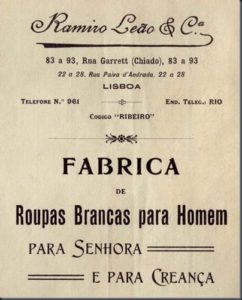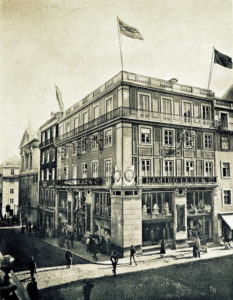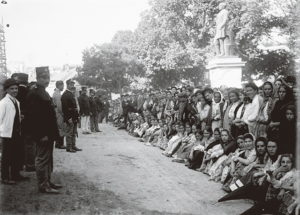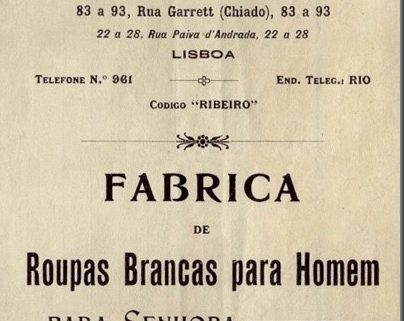RamiroLeão
 In the heart of Lisbon – on the Santana hill between the Travessa da Pena and the Beco de São Luis – used to be the clothing manufactory of Ramiro Leão.
In the heart of Lisbon – on the Santana hill between the Travessa da Pena and the Beco de São Luis – used to be the clothing manufactory of Ramiro Leão.
A textile factory of fabrics and shirts – surrounded by barracks for dying, laundry and ironing – build on top of a poor man’s cemetery of the long-gone hospital Todos os Santos (All Saints).
 Ramiro Leão (1857-1934), born in Gavião moved young to the capital, where he became one of the most powerful merchants and founder of the cosmopolitan warehouse Ramiro Leão & Co (nowadays United Colors of Benneton) in the glamorous Chiado neighbourhood.
Ramiro Leão (1857-1934), born in Gavião moved young to the capital, where he became one of the most powerful merchants and founder of the cosmopolitan warehouse Ramiro Leão & Co (nowadays United Colors of Benneton) in the glamorous Chiado neighbourhood.
He also was the director of the Chamber of Commerce, manager of the Bank of Portugal and City Councillor of Lisbon.
 Since the old factory broke down, it experienced a complete facelift and is nowadays a graceful blue eye-catcher in the skyline of Lisbon with nine apartments, a lush Mediterranean garden and a magnificent city view.
Since the old factory broke down, it experienced a complete facelift and is nowadays a graceful blue eye-catcher in the skyline of Lisbon with nine apartments, a lush Mediterranean garden and a magnificent city view.
On the 11th of July, 1915 the newspaper Voz do Operário (the Worker Voice) publishes a letter from the father of a needlewoman working in the factory of Ramiro Leão. It reveals that the workers have to pay for the sewing threads they use ( 80-90 cent a week) and are forced to pay a deposit to cover any damage done to the machines they work with. Working hours are long, conditions very poor and their weekly salary only 180-220 cents.
In the August 8 edition, the Seamstresses Union – whose leaders belong to the hardcore of the Union of Socialist Women – declares to defend their companions. A committee, including three workers from the Ramiro Leão factory – Miquelina Furtado, Laurinda Pinheiro e Lucia Martins – is set up to promote a law that limits working hours. The factory manager immediately fires the three woman as ‘irreducible revolutionaries’ and ‘disturbing elements.’
 In protest against this dismissal, a massive strike takes place the next day outside the gates of the factory. The strikers look for Ramiro Leão but he refuses to recognize the Union and its members. The peaceful protest lasts about four and a half hours and is finally swept away by military force.
In protest against this dismissal, a massive strike takes place the next day outside the gates of the factory. The strikers look for Ramiro Leão but he refuses to recognize the Union and its members. The peaceful protest lasts about four and a half hours and is finally swept away by military force.
The Ramiro Leão women’s strike was defeated but paved the way for a law in 1919, that limited working hours to eight hours a day.
Aproveite sua semana Enjoy your week (pic Vozoperário)









